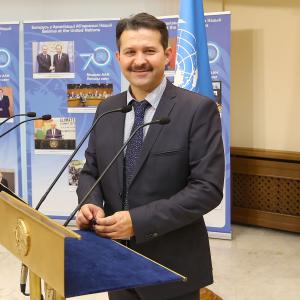Launch of international program track. SDG Ambition. Russia + Belarus
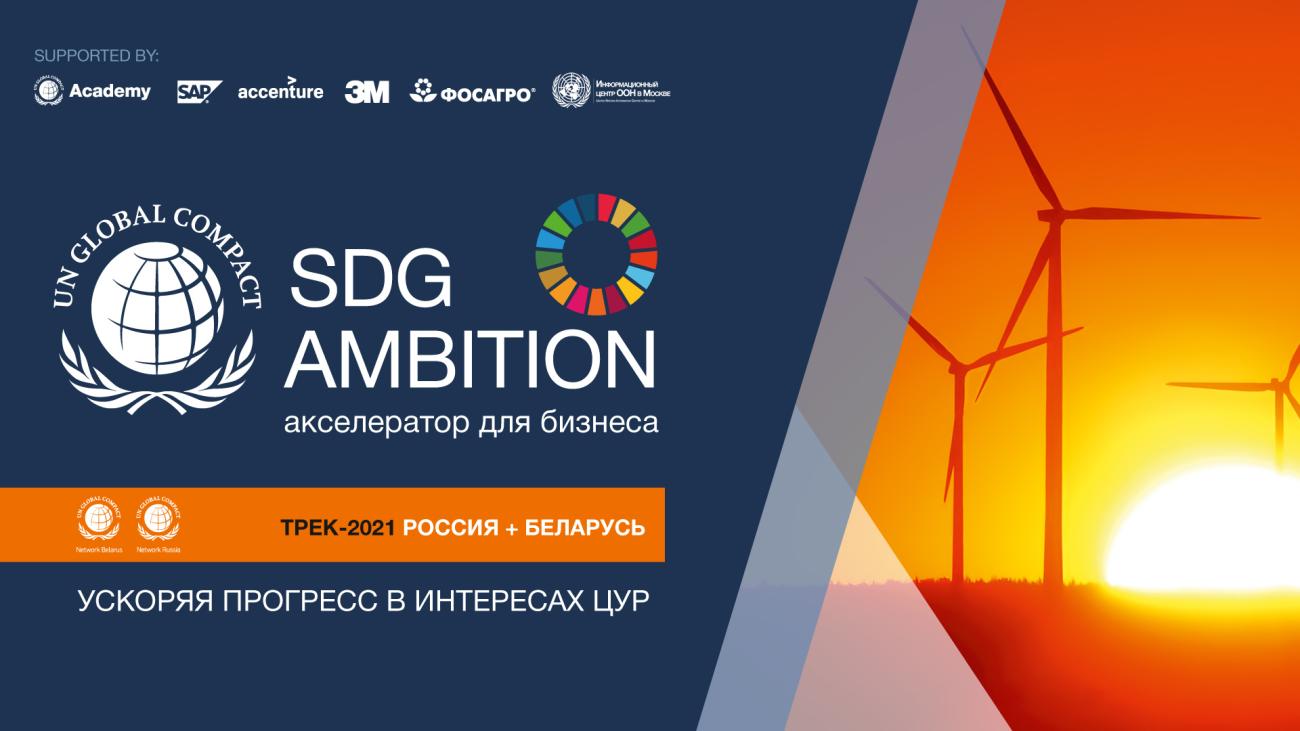
On February 3, 2021, SDG Ambition, a new international program under the UN Global Compact, officially launched in Russia and Belarus.
On February 3, 2021, Russia Today, international news agency, hosted a press briefing to officially launch in Russia and Belarus a new international program SDG Ambition initiated by the United Nations Global Compact in partnership with SAP, Accenture and 3M global companies and supported by PhosAgro, a Global Compact member with LEAD status.
SDG Ambition is a six-month accelerator training program for companies who responded to the UN call for the need of a more visible and rapid progress of business in achieving the 2030 Sustainable Development Goals (SDGs) and are interested to acquire new competences and knowledge necessary for transformation of business strategies and practice for SDGs, better understanding of the values of business resilience and factors of its long-term growth, setting science-based ambitious objectives and introduction of new models of corporate management synchronized with the Agenda 2030.
The program focuses on the effectiveness of corporate actions with account taken of local outlook in the global SDG context and provides for a series of webinars, lectures, local expert sessions, online work on the SDG Ambition platform, public events and discussions including on the international sites of the UN Global Compact in 2021. The Program also focuses on specific research, publications and guides offered by UN Global Compact as recommendations, and SDG business benchmarks - sets of measurable criteria and standards designed to meet today's reporting requirements, which can be applied to all industries and adjusted to any company.
Globally, the program is announced by the UN Secretary General António Guterres in January 2020 during the World Economic Forum in Davos: SDG Ambition – Scaling Business Impact for the Decade of Action. In June 2020, heads of the UN Global Compact and Accenture presented a set of 10 SDG Business Benchmarks at the UN Global Compact Leaders Summit and announced a consultation period, the outcomes of which were considered and presented in a special publication. In September, SDG Ambition guides were presented at the historic 75th jubilee session of the UN General Assembly and related UN Global Compact activities held in partnership with Accenture and SAP.
By the beginning of 2021, over 600 companies out of the applicants from 32 countries had been selected and now over two dozens of SDG Ambition training tracks are being launched based on the Global Compact national networks. The Global Compact network in Russia joined the Program together with the Global Compact network in Belarus thus creating a “Russia + Belarus” track that unites 29 companies from Russia and 11 from Belarus who represent the leaders of these national economies.
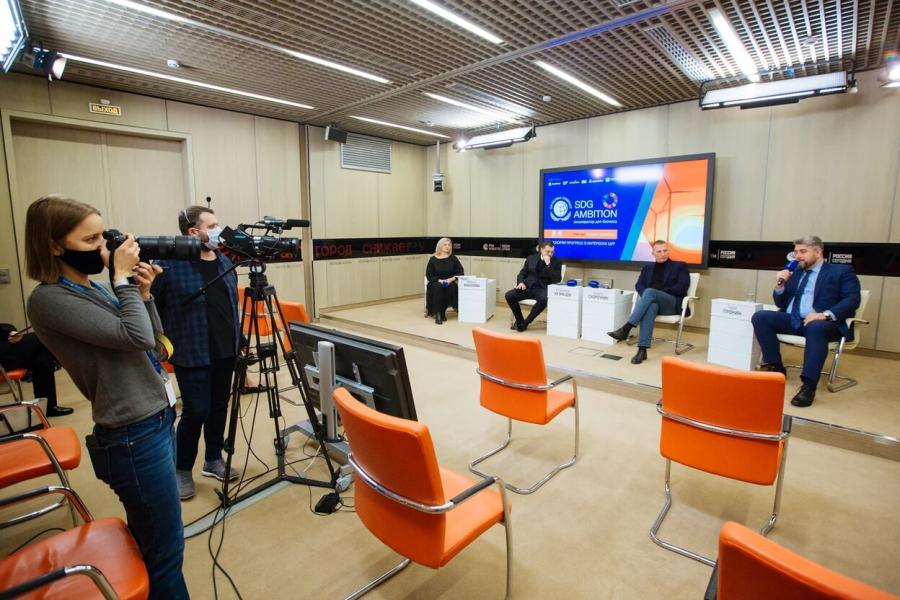
Speakers:
1. Taras Pronin, Head, Division for ECOSOC and UN Regional Commissions, Department for International Organizations, Ministry of Foreign Affairs of Russia
2. Vladimir Kuznetsov, Chair, UN team in Russia, Director of United Nations Information Centre in Moscow
3. Joanna Kazana-Wisniowiecki, United Nations Resident Coordinator in Belarus
4. Natalia Stapran, Director, Multilateral Economic Cooperation and Special Projects Department, Ministry of Economic Development of Russia
5. Andrei Skorochkin, Managing Director, Accenture Strategy Lead, Russia
6. Alexander Sharabaiko, member of the Board, Deputy General Director: Finances and International Projects, PhosAgro - a Global Compact member with LEAD status, member of the Steering Committee of the association “National Network of the Global Compact”
7. Martin Rich, Co-Founder, Executive Director, Future-Fit Foundation (Great Britain)
8. Antonio Hautle, Executive Director, Global Compact network Switzerland
9. Pettiina Niiranen, Director, Global Compact Network Finland
10. Tamanna Girdhar, Head, Global Compact Network India
11. Maxim Podberezkin, Executive Director, Global Compact Network Belarus
12. Marina Vashukova, Executive Director, the association “National Network of the Global Compact” (moderator)
QUOTATIONS:
Taras Pronin, Head, Division for ECOSOC and UN Regional Commissions, Department for International Organizations, Ministry of Foreign Affairs of Russia
As a state sector we urge business communities to join the UN Global Compact initiative through undertaking objectives and obligations of the UN Global Compact. The UN Global Compact is one of UN flagship initiatives designed to mobilize business for joint efforts aimed at SDG achievement. The role of SDG Ambition program is essential during the pandemic and its consequent effects. It is very encouraging that the program is launched jointly for Russia and Belarus as the relationship of these two nations’ business under the Global Impact is crucial for the achievement of SDGs.
Vladimir Kuznetsov, Chair of UN team in Russia, Director of United Nations Information Centre in Moscow
I would like to sound more upbeat but have no such a chance because even a year ago, when the SDG Ambition initiative was first launched, UN Secretary General spoke about the lack of efforts applied by countries to achieve the desired goals by 2030. In light of the pandemic’s devastating after-effect and loss of 500 million workplaces, the key objective remains the same - maximum involvement of business community who has all necessary capacities to enable embodiment of our ambitions associated with the Agenda 2030. SDG Ambition accelerator is an important training project and we believe that the program will reach as many business community representatives in Russia and Belarus as possible.
Joanna Kazana-Wisniowiecki, United Nations Resident Coordinator in Belarus
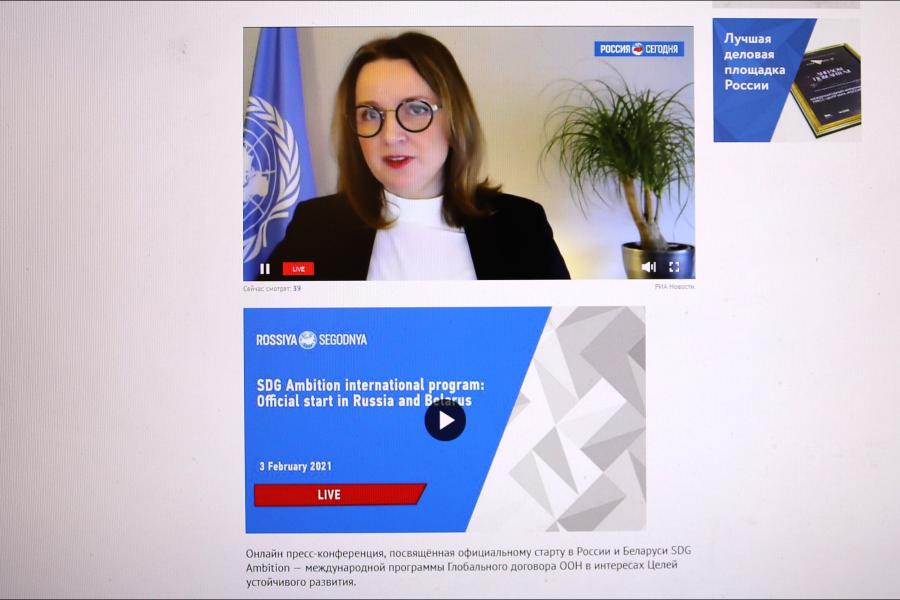
As we enter the Decade of Action on Sustainable Development, the UN is advocating for acceleration of development efforts. This is the time to rethink policies and our real life production and consumption patterns. The governments and private sector must work together, with a new ambition, investing in sustainable development.
Covid-19, and the speed of change and human adjustment to the changing world, teach us many lessons, negative and positive. Let’s use this once in a lifetime opportunity and direct the stimulus packages and economic and social recovery funding, also the talent, capital and flexibility of the private sector into solutions that will work in the long term, for all people and tor the planet.
Natalia Stapran, Director of Multilateral Economic Cooperation and Special Projects Department, Ministry of Economic Development of Russia.
We understand that there remains a segment of business that still does not fully incorporate the principles of sustainable development and Global Compact in their work. Therefore we are ready to share experience as part of SDG Ambition program and develop a pool of best practices. We always try to emphasize that sustainable development agenda offers new possibilities and new openings. To highlight, to emphasize, to find and to teach – this, I believe, is a good mission, for which the Program’s organizers and partners are to be thanked. On our part, we are always open to cooperation and partnership.
Martin Rich, Co-Founder and Executive Director of Future-Fit Foundation (Great Britain).
Responding to the call for SDG achievement the overwhelming majority of companies will have to cardinally transform their business models. Such activities do not mean an additional option for business, which many managers are hoping for, but an essential prerequisite for sustaining their business and the planet.
Antonio Hautle, Executive Director of Global Compact network Switzerland)
It is remarkable that we practice such collaboration between the UN Global Impact national networks. In Switzerland, it is very important to us that companies build their business processes in view of Ten Principles of the Global Compact, which I always highlight for our participants. We also believe that it is crucial to focus on harmonization of the integrated approach to the Agenda 2030 while evaluating their corporate competences in terms of 17 Sustainable Development Goals. Due to the fact that the majority of countries have agreed upon integrated actions for the Agenda 2030 we hope that it will trigger the opening of new opportunities, which we will be pleased to develop and maintain.
Pettiina Niiranen, Director of Global Compact Network Finland
Business community is well positioned to promote fast and cardinal innovations capable of initiating changes towards more sustainable future. The best way to strengthen local opportunities and increase participation of business in SDG achievement is partnership and cooperation with other pioneers.
Tamanna Girdhar, Head of Global Compact Network India
The pandemic highlighted the relationship between business, nature and society when it made us understand that life is not linear and there is no single solution in it. The call to search for optimized solutions in accordance with SDGs is rational. The time has come for companies and institutions to pledge to measurable, ambitious and business-oriented obligations to achieve SDGs in parallel with the UN Global Compact principles of responsible business. While building their process in accordance with the UN Global Compact principles companies may take strategic measures to promote more ambitious social goals with a focus on cooperation and innovations. In this context, the Global Compact network in India intensified its efforts to accelerate the transformation program - the time has come to make decisions and confirm our ambitions with regard to SDG.
Alexander Sharabaiko, member of the Board, Deputy General Director: Finances and International Projects, PhosAgro - a Global Compact member with LEAD status
The Company is keen to set a positive example and attract the attention of other Russian businesses to the 2030 Agenda. Achieving the SDGs is a priority for the Company’s long-term development strategy. Along with recognising the importance of all 17 SDGs, PhosAgro has been supporting the implementation of 11 specific ones. In December, PhosAgro’s CDP rating, a key indicator from one of the most in-depth studies of companies’ climate agendas, was raised from C to B-. The influential international agency Sustainalytics, in its annual review of ESG risk ratings, raised PhosAgro rating considerably – from 43.8 to 26.9 points – ranking the Company among the top three enterprises in the global agrochemical industry.
As a producer of eco-friendly mineral fertilizers free of dangerous concentrations of toxic metals, is actively involved in creating a “Green Standard” for Russian agricultural products. As part of its support, the Company helped found the Green Club, an independent association of manufacturers and suppliers of eco-friendly products.
We are truly pleased to have the opportunity to partner with SDG Ambition’s regional branch and to support the Global Compact national network in implementing this extremely important initiative for our business. I am confident that this international experience will serve as a great example to other Russian companies and encourage them to enhance their focus on ESG.
Andrei Skorochkin, Managing Director of Accenture Strategy Lead, Russia
Accenture is a global partner of the Global Compact program SDG Ambition, supporting its implementation worldwide. The role of our company in SDG Ambition accelerator consists of development of training materials in partnership with the UN Global Compact, facilitation of workshops and activities for program participants as well as provision of local expertise in sustainable development area. We believe that the Russian market has great mobilization capacities based on the high level of digital maturity for accelerated development in achieving Sustainable Development Goals.
Maxim Podberezkin, Executive Director of Global Compact Network Belarus
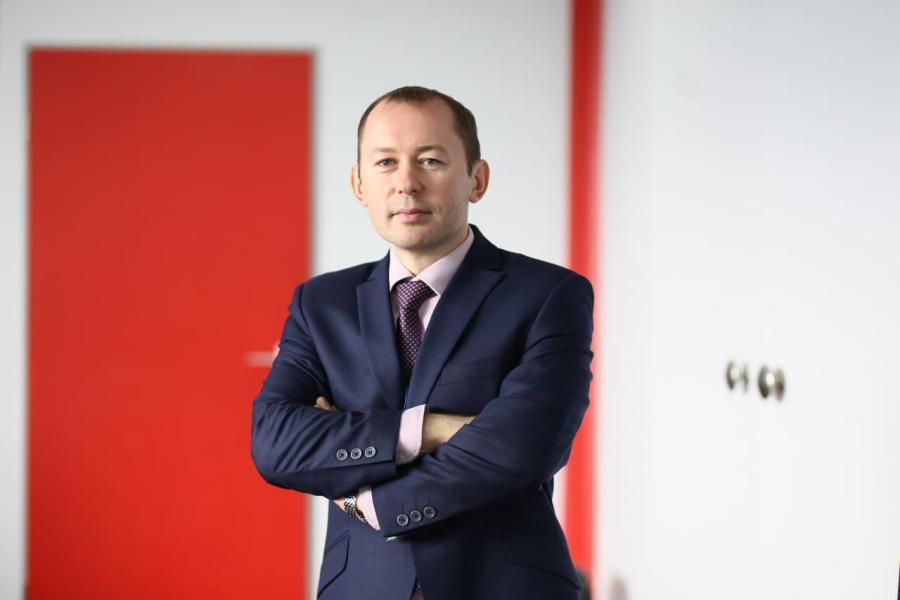
Today, the role of business in SDG achievement is not less important and maybe even more important than that of the state. Labour activities, education, healthcare, science, innovations – business is setting the pace of development everywhere. Leadership of business in many spheres is indisputable. Companies have already extended beyond long established standards of finance indicators and started to observe the indicators of their impact and sustainability. This is particularly the case of the UN Global Compact participants. The level of relationship between business and all the parties concerned is growing. Today, we are proud of our sports champions, arts and culture stars and we also must be proud of those business companies, the leaders, who make our life better by creating the world we all would like to live in. At the same time, principles-based behaviour is crucial to achieving SDG today. Only the activities fully consistent with ten universal principles of the Global Compact can actually contribute to SDG achievement. Successful business is sustainable business. Sustainable business is open, honest, responsible, ecologically acceptable, scrupulous business. This is the business that inspires confidence among clients and partners. Therefore, capitalization of confidence is what makes modern business more successful.
Marina Vashukova, Executive Director of the association “National Network of the Global Compact” in Russia.
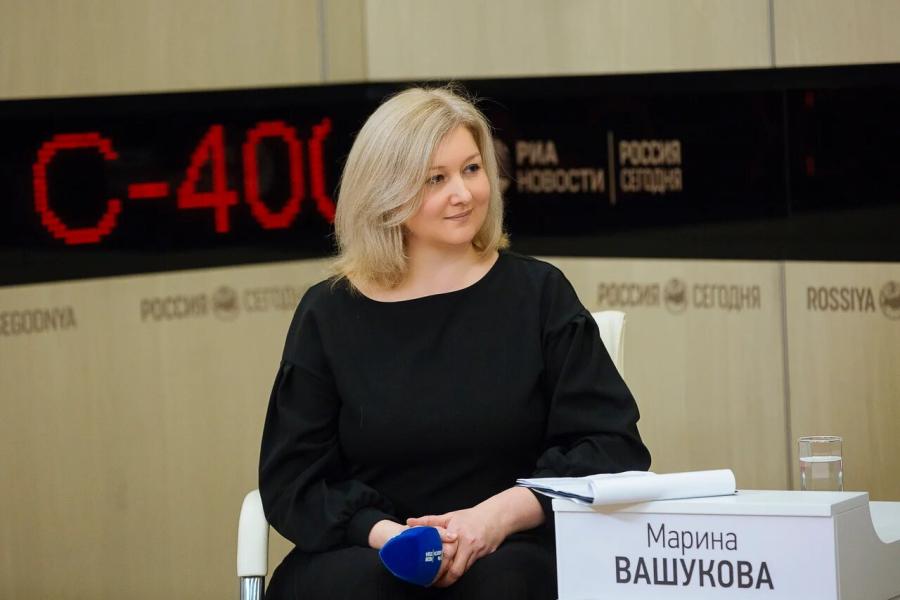
Engagement in the program will enable its participants to analyse a vast amount of methodological, analytical materials on peculiarities of work from SDG perspective. We observe the growing demand of business for such type of support, consultations and options to develop competences. Today, simply supporting the agenda is not enough as today is the time to master specific tools, models, standards and comprehensive expertise in the field of sustainable development.
The full recording of the discussion
SDG Ambition intelligent partners
SAP – is a world leader in business software, whose services are used in 180 countries. SAP develops machine learning, Internet of things (IoT) and other cutting-edge solutions, but its today’s objectives are far beyond the limits of business. With SAP solutions business can have positive economic, social and ecological effects. SAP helps to measure and reduce emissions, eradicate slavery in supply chains, stimulate zero-waste circular economy and eliminate inequality.
3М Company - is a research company, whose products and solutions are important to many industries and markets, it is the company that works to enable more accessible supporting technology, uses scientific advances to improve people’s life. Science for the circular economy development, science for the fight against climate change, science for the society development - these are the three priorities of 3М Company’s strategy. In 2019, the company decided that 100 per cent of its new products, even at the stage of commercialization, would be assessed against such values as the use of secondary raw materials and recyclables, energy efficiency and efficient water utilization, recyclability of products and reduction of resource consumption.
Accenture – is a consulting company, which provides a wide range of services to its clients in more than 120 countries. The company defines SDG as a part of its business strategy and therefore it develops keeping in mind that SDG must be integrated in business processes and implemented efficiently for the planet, society and world economy. Accenture turns its focus towards helping the companies to systematically approach the implementation of the sustainable development agenda.
SDG Ambition participating companies (Russia + Belarus track)
Belarus:
1. OAO ASB Belarusbank
2. OAO BSW - Management Company of BMC Holding
3. ZAO BSB Bank
4. IBA Group, group of companies
5. ZAO Qulix Systems
6. SOOO Mobile TeleSystems
7. ZAO MTBank
8. ProLiv, group of companies
9. OOO SoftTeco
10. IOOO Epam Systems
11. OOO Ermita
Russia:
1. AKIG, group of companies
2. OOO BMG
3. VEB.RF, State Development Corporation
4. PAO LSR Group
5. OOO X5 Retail Group
6. Inter RAO Group
7. OOO Management Company METALLOINVEST
8. PAO NLMK
9. PAO Mining and Metallurgical Company NORILSK NICKEL
10. Petropavlovsk Group
11. PIK, group of companies
12. PAO Polus
13. OOO Remmontazh
14. Rosatom State Corporation
15. Rosneft Oil Company
16. RUSS-INVEST Investment Company
17. Certification Association “Russian Register”
18. Sakhalin Energy Oil and Gas Company
19. Sveza, group of companies
20. PAO Severstal
21. PAO Sistema financial company
22. OOO Smart Engines Service
23. PAO Sovkombank
24. PAO Tatneft
25. Association of donor organizations “Donor’s Forum”
26. PAO FosAgro
27. OOO Center of Corporate Medicine
28. MKPAO EN+GROUP
29. ETALON Association
Written by
